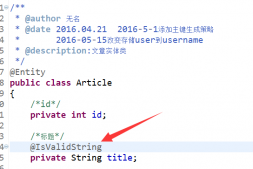简述
一直对Java没有现成的委托机制耿耿于怀,所幸最近有点时间,用反射写了一个简单的委托模块,以供参考。
模块API
|
1
2
3
4
5
6
7
8
9
10
11
12
13
14
15
16
17
|
public Class Delegater()//空参构造,该类管理委托实例并实现委托方法 //添加一个静态方法委托,返回整型值ID代表该方法与参数构成的实例。若失败,则返回-1。 public synchronized int addFunctionDelegate(Class<?> srcClass,String methodName,Object... params);//添加一个实例方法委托,返回整型值ID代表该方法与参数构成的实例。若失败,则返回-1。 public synchronized int addFunctionDelegate(Object srcObj,String methodName,Object... params);//根据整型ID从委托实例中删除一个方法委托,返回是否成功 public synchronized Boolean removeMethod(int registerID);//依次执行该委托实例中的所有方法委托(无序) public synchronized void invokeAllMethod();//将参数表转换为参数类型表 private Class<?>[] getParamTypes(Object[] params);//由指定的Class、方法名、参数类型表获得方法实例 private Method getDstMethod(Class<?> srcClass,String methodName,Class<?>[] paramTypes);class DelegateNode(Method refMethod,Object[] params)//DelegateNode类在不使用Object构造时叙述了一个静态方法委托,包括方法实例及参数表 class DelegateNode(Object srcObj,Method refMethod,Object[] params)//DelegateNode类在使用Object构造时叙述了一个实例方法委托,包括类实例、方法实例及参数表 public void invokeMethod();//执行该节点叙述的方法委托 |
源代码
|
1
2
3
4
5
6
7
8
9
10
11
12
13
14
15
16
17
18
19
20
21
22
23
24
25
26
27
28
29
30
31
32
33
34
35
36
37
38
39
40
41
42
43
44
45
46
47
48
49
50
51
52
53
54
55
56
57
58
59
60
61
62
63
64
65
66
67
68
69
70
71
72
73
74
75
76
77
78
79
80
81
82
83
84
85
86
87
88
89
90
91
92
93
94
95
96
97
98
99
100
101
102
103
104
105
106
107
108
109
110
111
112
113
114
115
116
117
|
import java.lang.reflect.InvocationTargetException;import java.lang.reflect.Method;import java.util.Hashtable;/**Delegater类使用RTTI及反射实现Java下的委托机制 * @author 三向板砖 * */public class Delegater { static int register = Integer.MIN_VALUE; //ID分配变量 Hashtable<Integer,DelegateNode> nodeTable; //管理ID与对应委托的容器 public Delegater() { nodeTable = new Hashtable<Integer,DelegateNode>(); } //添加静态方法委托 public synchronized int addFunctionDelegate(Class<?> srcClass,String methodName,Object... params) { Class<?>[] paramTypes = getParamTypes(params); Method refMethod; if((refMethod = getDstMethod(srcClass,methodName,paramTypes)) != null) { register++; nodeTable.put(register,new DelegateNode(refMethod, params)); return register; } else { return -1; } } //添加动态方法委托 public synchronized int addFunctionDelegate(Object srcObj,String methodName,Object... params) { Class<?>[] paramTypes = getParamTypes(params); Method refMethod; if((refMethod = getDstMethod(srcObj.getClass(),methodName,paramTypes)) != null) { register++; nodeTable.put(register,new DelegateNode(srcObj,refMethod, params)); return register; } else { return -1; } } //删除一个方法委托 public synchronized Boolean removeMethod(int registerID) { if(nodeTable.containsKey(registerID)) { nodeTable.remove(registerID); return true; } return false; } //无序地执行委托方法 public synchronized void invokeAllMethod() { for (DelegateNode node:nodeTable.values()) { node.invokeMethod(); } } //将参数表转化为参数类型表 private Class<?>[] getParamTypes(Object[] params) { Class<?>[] paramTypes = new Class<?>[params.length]; for (int i = 0;i < params.length;i++) { paramTypes[i] = params[i].getClass(); } return paramTypes; } //根据Class类实例、方法名、参数类型表获得一个Method实例 private Method getDstMethod(Class<?> srcClass,String methodName,Class<?>[] paramTypes) { Method result = null; try { result = srcClass.getMethod(methodName, paramTypes); if(result.getReturnType() != void.class) { System.out.println("Warning,Method:"+methodName+" has a return value!"); } } catch (NoSuchMethodException | SecurityException e) { System.out.println("Can Not Found Method:"+methodName+",ensure it's exist and visible!"); } return result; }}class DelegateNode { Object srcObj; Method refMethod; Object[] params; public DelegateNode(Method refMethod,Object[] params) { this.refMethod = refMethod; this.params = params; } public DelegateNode(Object srcObj,Method refMethod,Object[] params) { this.srcObj = srcObj; this.refMethod = refMethod; this.params = params; } public void invokeMethod() { try { refMethod.invoke(srcObj,params); } catch (IllegalAccessException | IllegalArgumentException | InvocationTargetException e) { System.out.println("Method:"+refMethod.toString()+" invoke fail!"); } }} |
模块测试
|
1
2
3
4
5
6
7
8
9
10
11
12
13
14
15
16
17
18
19
20
21
22
23
24
25
26
27
28
29
30
|
public class DelegaterTest { public void showInfo() { System.out.println("Hello Delegate!"); } public void showCustomInfo(String info) { System.out.println(info); } public static void showStaticInfo() { System.out.println("Static Delegate!"); } public static void showCustomStaticInfo(String info) { System.out.println(info); } public static void main(String[] args) { Delegater dele = new Delegater(); DelegaterTest tester = new DelegaterTest(); int ID = dele.addFunctionDelegate(tester,"showInfo"); dele.addFunctionDelegate(tester,"showCustomInfo","Custom!"); dele.addFunctionDelegate(DelegaterTest.class,"showStaticInfo"); dele.addFunctionDelegate(DelegaterTest.class,"showCustomStaticInfo","StaticCustom!"); dele.invokeAllMethod(); dele.removeMethod(ID); System.out.println("------------------"); dele.invokeAllMethod(); }} |
执行结果:
StaticCustom!
StaticDelegate!
Custom!
HelloDelegate!
------------------
StaticCustom!
StaticDelegate!
Custom!
其他事项
一些public方法使用synchronized是为了保证register变量的线程安全,使其不会因为多线程而出错。
对于有返回值的委托,会报出警告,但模块还是接受这样的委托的,不过在执行委托时您将不能得到返回值。
添加的委托最大值是Integer.MAX_VALUE-Integer.MIN_VALUE超出后的容错处理没有考虑(一般也没这么多函数需要委托的吧。
委托执行是无序的,而且,需要性能要求时,委托的函数尽量不要有阻塞过程,否则会影响其他委托函数的执行。
还有什么问题可以发上来一同探讨。
总结
以上就是本文关于通过反射实现Java下的委托机制代码详解的全部内容,希望对大家有所帮助。感兴趣的朋友可以继续参阅本站其他Java相关专题,如有不足之处,欢迎留言指出。感谢朋友们对本站的支持!
原文链接:http://blog.csdn.net/shuzhe66/article/details/26148115















